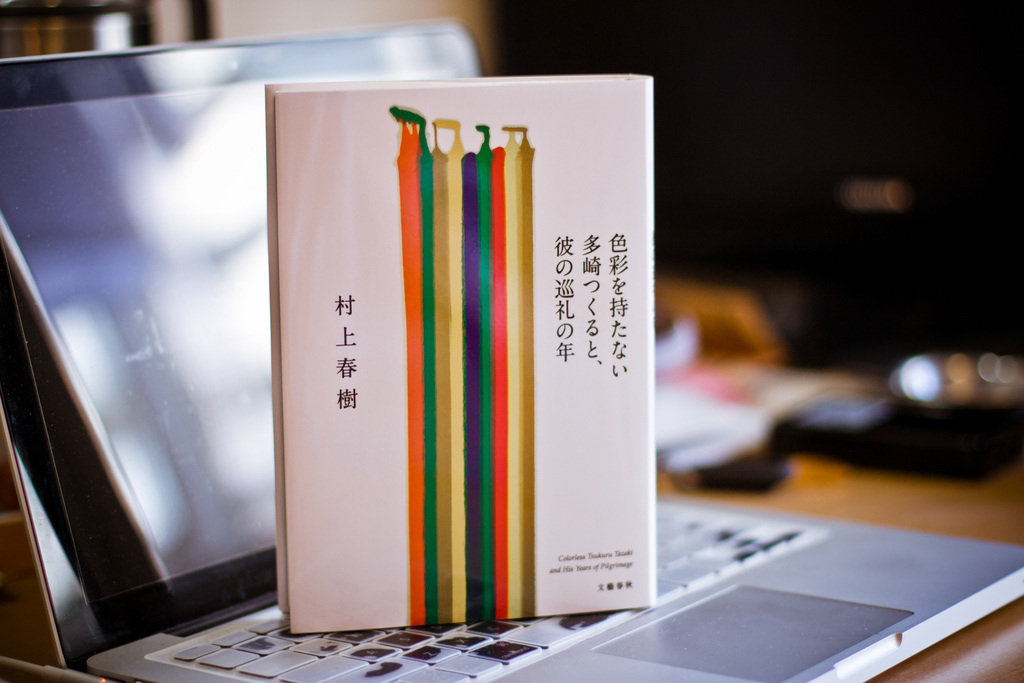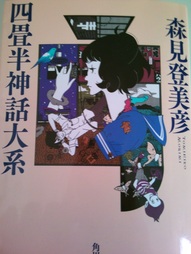Haruki Murakami- Colorless Tsukuru Tazaki and His Years of Pilgrimage
| Haruki Murakami's work is a good part of the reason I decided to study Japanese in the first place, though much of that credit goes to his seriously talented translators as well. I worked with a couple of his short stories for my senior thesis in college, and recently started translating some of his newest novel, Colorless Tsukuru Tazaki and His Years of Pilgrimage (Japanese: 色彩を持たない多崎つくると、彼の巡礼の年 | Shikisai wo Motanai Tazaki Tsukuru to, Kare no Junrei no Toshi). There's no official English release yet, but looks like it'll be here August 12th. Below I've shared probably the most "oh yep this is Murakami" passages out of what I've done so far. If you're into it, buy the book when it's available! Trigger warning: both the book and this post contain suicidal and deathly thoughts described in sometimes unsettling detail. |
Normally he wasn't even aware of it, but there was one place on Tsukuru's body that had a terribly delicate sensitivity. It existed somewhere on his back. It was a soft and tender place that he couldn't reach with his hands, normally covered up and invisible from the outside. But when he least expected it, some accident would expose the spot, and someone's fingertip would find it. Then something would begin to work inside him, and an unusual substance would start secreting through his body. That substance would blend with his blood, permeating every nook and cranny of him. The stimulus that was born from that secretion manifested in a feeling that was both concrete and imaginary, simultaneously.
The time he first met Sara, he had felt the sensation of an anonymous finger, extended from who knew where, that pressed deeply into the switch on his back. They had talked at fair length that day, but he could barely remember what about. All he remembered was the small gasp and the sensation on his back, and the indescribable stimulus that it wrought in his mind and body. Like he was part loose, part drawn tight. That sort of feeling. What on earth was it supposed to mean? .... Unfortunately, he was by nature ill-suited to thinking over abstract, shapeless ideas. Tsukuru sent her a message inviting her out to eat. He meant to find the meaning behind the sensation and the stimulus. from Chapter 1
He was surrounded, as far as he could see, by earth littered with wild rocks. There was not a single drop of water or blade of grass. This place was empty of color and even the light seemed un-light--there was no sun, no moon nor stars, and most likely there were even no directions. There was only the enigmatic twilight and bottomless dark, trading places at predetermined times. It was the furthest reach of what a conscious being could perceive. Yet in its own way, it was rich with life. In the twilight time, flocks of birds came with razor-sharp beaks, and gouged out his flesh without mercy. But in the silence when darkness hid the earth's surface, and the birds took off to who knew where, this place filled the newly carved space in his body with substitutes.
Tsukuru didn't understand the things that made up his new substitute flesh, and he never had the chance to approve or reject them. They came as swarms of shadows to alight on his body, and laid thousands of their shadow eggs. When at last the dark retreated and twilight returned, the birds came again, and pecked furiously at his body.
At times like those, he was himself, but in another way he was not. He was Tsukuru Tazaki, and he wasn't. When his pain became unbearable, he left his body. From a painless place a short distance away, he would observe the suffering form of Tsukuru Tazaki. If he concentrated his whole awareness on it, it wasn't impossible.
Even now, the feeling of leaving himself, of gazing at his own pain like it belonged to someone else, could still be reawakened within him when he least expected it. from Chapter 2
Well, that was a whole barrel of monkeys, wasn't it? That passage about the spot on Tsukuru's back is a very Murakami-esque one--that intimate physical description of a certain spot on the body having weird, unexplainable, driving power. If it were about ears, we'd be on our way to winning Haruki Murakami Bingo!
Favorite word/phrase I learned: Not featured in these passages, but possibly 笠雲 (かさぐも, kasagumo): a "cap cloud (cloud shaped like an Asian bamboo hat that forms at the peak of a tall mountain)". Interestingly, though, when Murakami uses this word, he changes it up a little: in the dictionary entry I've cited, the character kasa (笠) means the aforementioned conical Asian bamboo hat, but Murakami replaces it with another character also read kasa: 傘, meaning "umbrella." I haven't looked too deeply into it, but a couple quick dictionary and Google searches suggest that this is not a common spelling. My first instinct is that this is more likely to be the author playing with language than making a typo, and doing it in what is--let's be honest--a pretty cute way, too.
Also, I just ordered Murakami's most recent short story collection, Men Without Women (Onna no Inai Otoko-tachi), minutes before writing this up. My mouth's watering a little bit.
Favorite word/phrase I learned: Not featured in these passages, but possibly 笠雲 (かさぐも, kasagumo): a "cap cloud (cloud shaped like an Asian bamboo hat that forms at the peak of a tall mountain)". Interestingly, though, when Murakami uses this word, he changes it up a little: in the dictionary entry I've cited, the character kasa (笠) means the aforementioned conical Asian bamboo hat, but Murakami replaces it with another character also read kasa: 傘, meaning "umbrella." I haven't looked too deeply into it, but a couple quick dictionary and Google searches suggest that this is not a common spelling. My first instinct is that this is more likely to be the author playing with language than making a typo, and doing it in what is--let's be honest--a pretty cute way, too.
Also, I just ordered Murakami's most recent short story collection, Men Without Women (Onna no Inai Otoko-tachi), minutes before writing this up. My mouth's watering a little bit.


 RSS Feed
RSS Feed